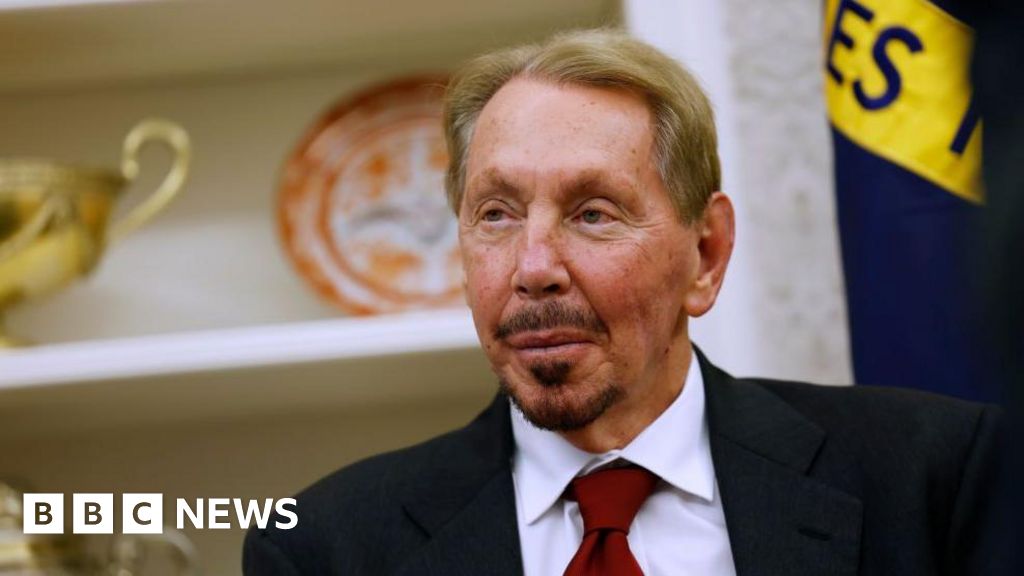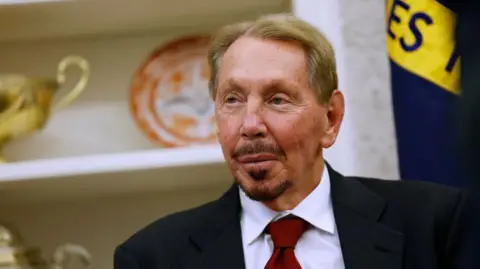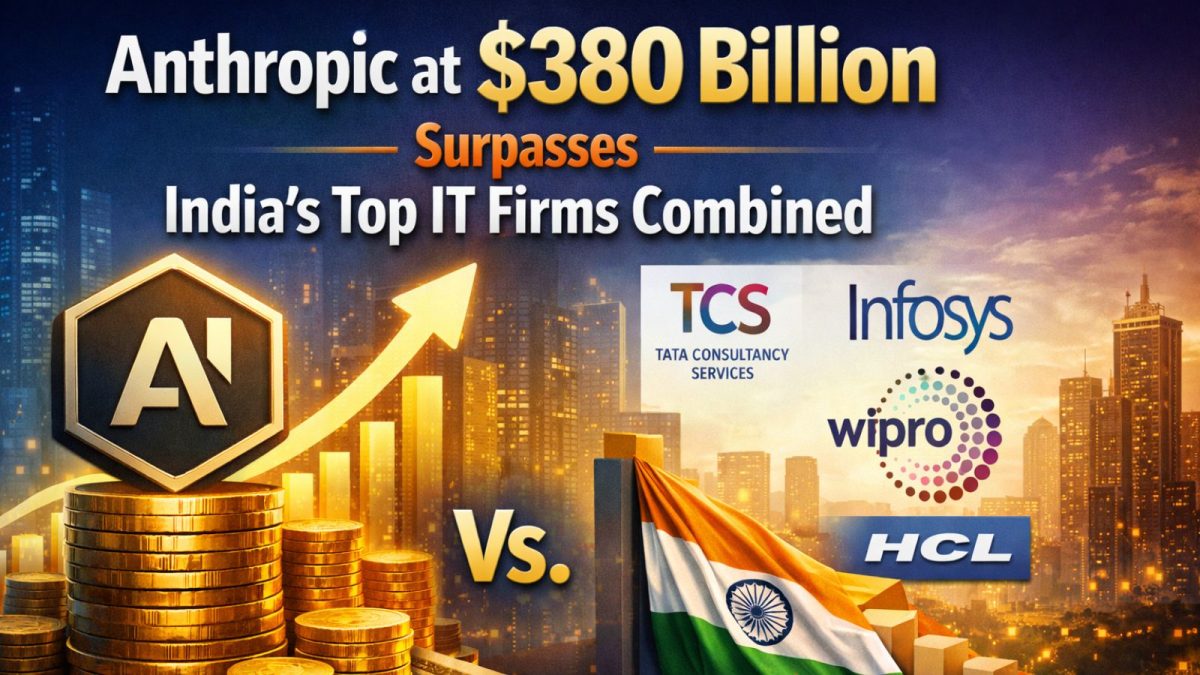Business
Oracle’s Larry Ellison surpasses Elon Musk as world’s richest man

Danielle KayeBusiness reporter
 Getty Images
Getty ImagesElon Musk has lost his title as the world’s richest person to Larry Ellison, the co-founder of Oracle and an ally of US President Donald Trump.
Ellison’s wealth surged to $393bn (£290bn) on Wednesday morning, surpassing Musk’s $385bn (£284bn), according to the Bloomberg Billionaires Index.
Shares in Oracle soared more than 40% after the database software company gave investors a surprisingly rosy outlook for its cloud infrastructure business and artificial intelligence (AI) deals.
Ellison, whose net worth is tied to the company, has steadily built his fortune over the past five decades.
Musk had held the title of world’s richest person for nearly one year. He could receive a pay package worth over $1tn (£740bn) if he hits a list of ambitious targets over the next decade, the board of the electric car firm has proposed.
But shares in Musk’s most valuable business, Tesla, have fallen this year.
The electric vehicle maker has grappled with investor jitters over the Trump administration’s rollback of electric vehicle initiatives, on top of consumer backlash to Musk’s political involvement.
Oracle has recently been propelled by growing demand for data centre infrastructure.
The company projected as part of its quarterly earnings report on Tuesday that revenue from its cloud business will jump 77% this year, to $18bn, with further growth expected in the coming years.
Oracle has reported a surge in demand among AI companies for its data centres, which helped push its stock dramatically higher.
It signed four multibillion-dollar contracts with customers in the last quarter and anticipates several more deals in the months ahead, chief executive Safra Catz said on Tuesday.
Trump ties and media ambitions
Ellison, 81, helped start Oracle in 1977 and rose to prominence in the 1990s, when he became a public figure known as much for his lavish lifestyle as for the database company behind his fortune.
He was Oracle’s chief executive until 2014 and is now the company’s chairman and chief technology officer.
And he has positioned himself as an ally to President Trump.
When Trump returned to the White House in January, Ellison appeared alongside OpenAI’s Sam Altman and SoftBank’s Masayoshi Son to announce a project called Stargate, to build out AI infrastructure in the US.
Oracle has also emerged as a possible buyer of TikTok, the app owned by the Chinese internet company ByteDance. TikTok is facing a ban in the US unless it divests itself of its ByteDance ownership.
In January, when asked whether he was open to Musk buying TikTok, Trump responded: “I’d like Larry to buy it, too.”
Ellison’s media ambitions extend beyond TikTok.
He funded the bulk of a $8bn bid by his son to acquire Paramount, which owns CBS and MTV.
That deal between Paramount and the media company Skydance, which is controlled by his son David, closed last month.
Business
Anthropic At $380 Billion Surpasses India’s Top IT Firms Combined As AI Fears Rock Stocks

Last Updated:
Anthropic’s AI tools have triggered a sharp decline in Indian IT stocks like TCS, Infosys, Wipro, eroding Rs 3,11,873 crore in market value.


Anthropic’s valuation surpassed combined value of total IT firms in India
The entire Information Technology (IT) industry in India is battering with the existential threat, which comes on the heels of rising generative AI, posing doubts over the viability of their business model.
Stocks of the IT industries, including Tata Consultancy Services (TCS), Infosys, Wipro, etc., hit brutally over the past week. This was triggered with the launch of new AI tools by Anthropic’s Claude for Cowork, which is like an office teammate helping the user to do tasks such as file sorting, reading legal drafts, etc.
Recommended Stories
-
From TCS To Infosys: Top IT Stocks Wipe Out Rs 3 Lakh Crore In Market Value

-
Black Friday For IT Stocks? TCS, Infosys, Wipro Seen Under Pressure As US Tech Slumps

-
Infosys, TCS, TechM And Other IT Stocks Slide Up To 5% On Renewed AI Concerns After US Jobs Data

-
Stocks To Watch: Coal India, IRCTC, SpiceJet, Wipro, Infosys, GAIL India, Biocon, And Others

Anthropic’s Valuation vs Nifty IT Index
Anthropic’s phenomenal valuation rise has surpassed the combined value of India’s top IT firms. Standing at a valuation of $380 billion, the US-based AI company has eclipsed India’s Nifty IT index, whose market cap was at $296.4 billion by the time of writing this report.
Investors are accelerating their exit from technology stocks as concerns intensify that advanced artificial intelligence tools could disrupt core segments of the global software and IT services industry.
This week alone, TCS, Infosys and HCL Technologies dragged 9-11 per cent.
The sharp correction has wiped out substantial investor wealth. Based on intraday lows, the combined market capitalisation of the top five domestic IT companies has eroded by nearly Rs 3,11,873 crore this week.
TCS emerged as the biggest laggard, losing Rs 1,28,800 crore in market value, with its market capitalisation slipping to Rs 9,35,253 crore. The fall also pushed it to the fifth-most valued listed company from the fourth position.
Infosys has seen its market capitalisation shrink by Rs 91,431 crore following a 15 per cent decline this week. HCL Technologies has lost Rs 53,647 crore in market value over the past five trading sessions. Wipro and Tech Mahindra have also recorded declines, with their market capitalisations falling by Rs 22,762 crore and Rs 15,233 crore, respectively, during the same period.
| Company Name | Mcap ($Billion) |
| Tata Consultancy Services | 107.4 |
| Infosys | 61.2 |
| HCL Technologies | 43.6 |
| Wipro | 24.8 |
| Tech Mahindra | 16.6 |
| LTIMindtree | 16.7 |
| Persistent Systems | 9.5 |
| Oracle Financial Services Soft | 6.4 |
| Coforge | 5 |
| Mphasis | 5.2 |
| Total | 296.4 |
Source: Bloomberg
Anthropic’s Recent Funding Round
Anthropic has recently raised $30 billion in Series G funding led by GIC and Coatue, valuing Anthropic at $380 billion post-money, as announced by the company in the press release.
The investment will fuel the frontier research, product development, and infrastructure expansions that have made Anthropic the market leader in enterprise AI and coding.
February 14, 2026, 09:15 IST
Read More
Business
IndiGo plans to hire over 1,000 pilots after December’s crew crunch – The Times of India

IndiGo, the country’s largest airline is set to go on a hiring spree, bringing over 1,000 pilots on board. This comes after the aviation giant faced massive operational disruption last December, when the company was forced to cancel more than 5,000 flights within seven days.The fresh intake will span trainee first officers, senior first officers and commanders. A recruitment notice shows the carrier is also ready to accept applicants without time on the Airbus A320, the workhorse aircraft across its network, ET reported.Under the updated framework, the number of landings permitted between 12 am and 6 am has been limited, while the mandatory weekly rest period for pilots has gone up.A review carried out by the irectorate General of Civil Aviation concluded that the airline had neither hired in line with the new rules nor accelerated its training capacity. This, the probe noted, resulted in pilots being stretched through repeated reassignments, lengthier duty spans and greater use of deadheading, in which crew are moved as passengers to operate flights elsewhere.
Stepping up expansion
A senior official, as cited by ET, maintained that IndiGo is now lining up a steady supply of cockpit crew to keep pace with rapid aircraft additions. The airline’s in-house system is currently upgrading about 20–25 first officers to captain each month. Now, alongside hiring, the carrier has begun adjusting its network planning to create more breathing space in daily operations. From almost no buffer in December, the margin has been raised to 3% this month. Standby crew availability has also been lifted to a minimum of 15%.Fleet expansion is continuing at a brisk rate, with roughly four aircraft joining the airline every month on average.Training remains a long lead activity. Trainee first officers require around six months before they are cleared to operate, while promotion to captaincy demands at least 1,500 hours of flying, though airlines may prescribe stricter benchmarks.While the regulator’s baseline requirement is three sets of pilots per aircraft, including one captain and one first officer, IndiGo’s intense utilisation levels push its need to well over twice that figure.Figures placed during the inquiry into the December episode showed the airline needed 2,422 captains but had 2,357.
DGCA findings
After the disruption, the watchdog stepped in with temporary relaxations, suspending night-duty restriction rules until February 10.In its assessment, the DGCA said there was an overriding focus on maximising utilisation of crew, aircraft, and network resources, which significantly reduced roster buffer margins.The Directorate General of Civil Aviation said that the airline structured its crew schedules to extract the longest possible duty hours, leaning heavily on deadheading, tail swaps and stretched work patterns while leaving very little room for recovery. It noted that such planning weakened roster integrity and hurt operational resilience.
Business
Piyush Goyal Dismisses Rahul Gandhi’s Farmer Meet Video, Rebuts ‘Fake Narrative’ On India-US Trade Deal

Last Updated:
The minister offered a detailed reality check to counter what he termed ‘Rahul ji’s fakery’


Goyal reiterated that Prime Minister Narendra Modi’s policies are intrinsically linked to farmer welfare. (File Photo: PTI)
Union Commerce Minister Piyush Goyal has accused Congress leader Rahul Gandhi of orchestrating a “fake narrative” aimed at provoking India’s farming community. Responding to a video released on social media by the Leader of the Opposition on Friday, Goyal dismissed the interaction as a stage-managed performance featuring Congress activists masquerading as genuine farmer leaders. He asserted that the dialogue followed a predetermined script designed to mislead the public regarding the safeguards in the recent India-US trade deal.
Rahul Gandhi has alleged that “any trade deal that takes away the livelihood of farmers or weakens the food security of the country is anti-farmer”. He was pointing to the recently concluded India-US framework agreement for bilateral trade, which is expected to be signed after tweaks by the end of March.
Piyush Goyal offered a detailed reality check to counter what he termed “Rahul ji’s fakery”, placing on record that the Narendra Modi government has fully protected the interests of annadatas, fishermen, MSMEs, and artisans. The minister categorically clarified that sensitive crops like soyameal and maize have been granted no concessions whatsoever in the agreement, ensuring that domestic farmers remain shielded from competitive pressure. He criticised the opposition for repeating “baseless allegations” in an attempt to instill unnecessary fear among the rural population.
Addressing specific claims regarding apple and walnut imports, the minister provided a technical breakdown of the protectionist measures in place. He noted that while India already imports approximately 550,000 tonnes of apples annually due to high domestic demand, the new US deal does not allow unlimited entry. Instead, a strict quota has been established, far below current import levels, and subject to a Minimum Import Price (MIP) of Rs 80 per kg. With an additional duty of Rs 25, the landed cost of US apples will be roughly Rs 105 per kg—significantly higher than the current average landed cost of Rs 75 per kg from other nations—thereby ensuring Indian growers are not undercut. Similarly, for walnuts, the US has been offered a modest quota of 13,000 metric tonnes against India’s total annual import requirement of 60,000 metric tonnes, making it impossible for the deal to harm local producers.
Goyal also took a swipe at the historical record of the Congress party, pointing out the irony of its current stance. He reminded the public that during the Congress-led UPA era, India imported nearly $20 billion worth of agricultural products, including dairy items, which the current administration has strictly excluded from the US pact. He challenged Rahul Gandhi to explain his “betrayal of farmers” and questioned how much longer the opposition intended to peddle fabricated stories.
Concluding with the slogan “Kisan Surakshit Desh Viksit”, Goyal reiterated that Prime Minister Narendra Modi’s policies are intrinsically linked to farmer welfare. He maintained that the India-US agreement is a balanced framework that opens new markets for Indian exports like basmati rice and spices while keeping the nation’s agricultural backbone secure.
February 14, 2026, 05:29 IST
Read More
-

 Entertainment1 week ago
Entertainment1 week agoHow a factory error in China created a viral “crying horse” Lunar New Year trend
-

 Tech1 week ago
Tech1 week agoNew York Is the Latest State to Consider a Data Center Pause
-

 Business4 days ago
Business4 days agoAye Finance IPO Day 2: GMP Remains Zero; Apply Or Not? Check Price, GMP, Financials, Recommendations
-

 Tech1 week ago
Tech1 week agoNordProtect Makes ID Theft Protection a Little Easier—if You Trust That It Works
-

 Tech1 week ago
Tech1 week agoPrivate LTE/5G networks reached 6,500 deployments in 2025 | Computer Weekly
-

 Fashion4 days ago
Fashion4 days agoComment: Tariffs, capacity and timing reshape sourcing decisions
-

 Business1 week ago
Business1 week agoStock market today: Here are the top gainers and losers on NSE, BSE on February 6 – check list – The Times of India
-

 Business1 week ago
Business1 week agoMandelson’s lobbying firm cuts all ties with disgraced peer amid Epstein fallout






